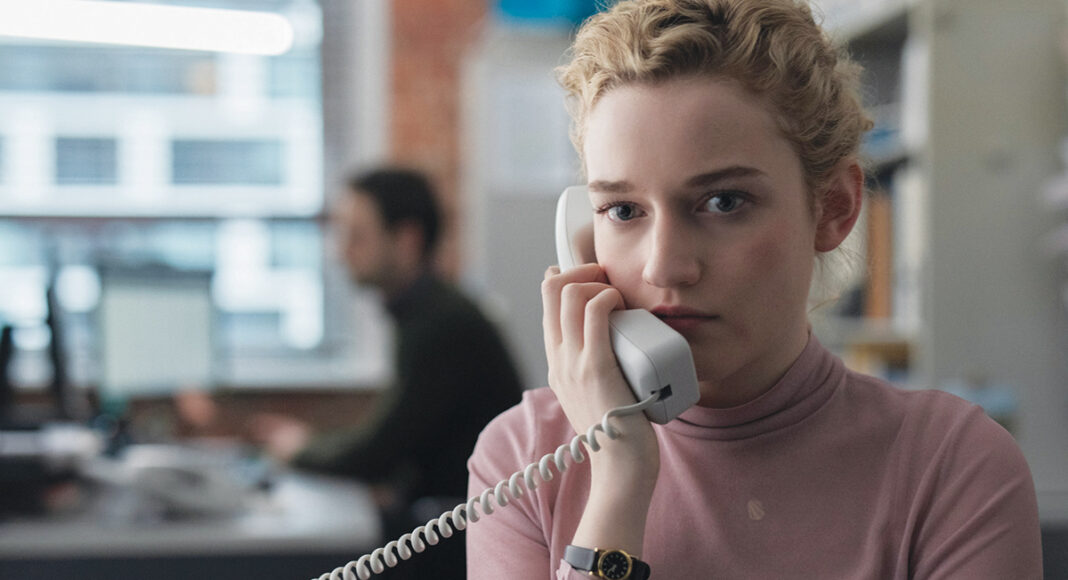Her new job as office assistant to a famous movie mogul ought to be a dream come true for a bright young college graduate with ambitions to produce movies of her own. But it’s starting to feel more like a nightmare for Jane (Julia Garner), the conflicted protagonist in The Assistant. As her duties gradually become more disturbing, we share every ripple of her unease in this taut, claustrophobic and entirely effective psychological drama from filmmaker Kitty Green.
Green was working on a documentary on sexual consent and the abuse of power on college campuses when the first stirrings of the Harvey Weinstein case broke all over the media. She decided to shift from doc to drama to focus her story not on predators or their victims, but on the system of silence and complicity that allows such misconduct to happen. She manages to sketch in this big picture by zeroing in on the tiny details of Jane’s daily routine and how they begin to affect her.
It’s pre-dawn when a car arrives for Jane to ferry her to her workplace. She’s the first one in the office, turning on the lights and making coffee as her two male officemates begin to drift in. Her duties include tidying up the boss’ inner office (and apparently scrubbing down the couch inside. “Never sit on the couch,” one co-worker jokes, when a meeting is called later in the day).
While her male colleagues analyze grosses and box office reports, Jane orders lunch, Xeroxes headshots of pretty young women, and organizes bottles of pills and boxes of syringes. It’s also her job to answer the phone, and if she happens to say the wrong thing to the boss’ irate wife, like revealing he is out of the office, Jane is likely to get an expletive-laden retort from the boss himself a few minutes later. (The guys in the office helpfully dictate her email of abject apology to mollify him.)
Around midday, a fresh-faced young woman (Kristine Froseth) arrives in the outer reception area, reporting for a new assistant job. She’s a waitress from Idaho that the boss apparently met at the Sundance festival, and Jane is directed to take her in a cab to a swanky hotel where the boss is putting her up. Later, her office-mates mention that the boss has gone there, too—information Jane is once again forbidden to reveal to the boss’ wife.
Jane is not a crusader; she doesn’t want to jeopardize her job. But her increasing discomfort over events of the day finally leads her to confide her doubts to the head of HR, hoping for advice. Matthew Macfadyen is terrifically glib and unctuous in the role; in the movie’s most revealing scene, he oozes faux camaraderie as he dismisses her fears—not because they are groundless, but because they are impossible to prove. He parrots back her fragile bits of evidence like a D.A. eviscerating an unreliable witness.
The unnamed boss himself is never seen, he’s just an angry voice ranting over the phone. Filmmaker Green’s design is not to single out any one person’s behavior, but to suggest how the entire system is skewed toward protecting predators in high places. Most important to Green is the psychological toll taken on Jane (and thousands of other low-level drones in her shoes) facing up to the grim fact that enabling is the unspoken part of her job description.
Garner has the pale, porcelain face of a Renaissance angel; it’s almost physically painful to watch her eyes, her expression, her entire demeanor darken with anxiety over the course of her workday. Had her story been told by a male filmmaker, it might have been more action-oriented, shaped more toward an opposition/redemption narrative. In Green’s hands, it’s more an accumulation of small, telling details that become almost interactive in their tacit challenge to the viewer: What would you do?
THE ASSISTANT
*** (out of four)
With Julia Garner, Matthew Macfadyen, and Kristine Froseth. Written and directed by Kitty Green. A Bleecker Street release. Rated R. 87 minutes.













